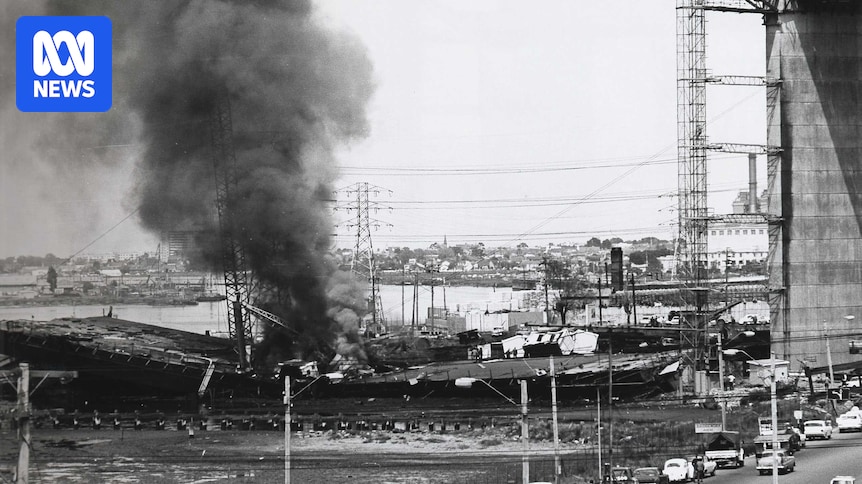
Dennis McIntosh vividly recalls the day the West Gate Bridge in Melbourne collapsed in 1970. As a primary school student just a kilometer from the site, he heard the catastrophic thud on October 15 when a 2,000-tonne section of the bridge, still under construction, fell, tragically claiming the lives of 35 workers. This disaster, Australia’s worst industrial accident, spurred the development of workplace safety measures that were codified into law 15 years later.
The incident occurred just months after a similar bridge designed by the same company collapsed in Wales, killing four workers. Rumors circulated among McIntosh’s classmates that the West Gate Bridge might suffer the same fate. “When [the bridge] did fall, we heard it. We heard the thud … [I remember] looking through the cyclone-wire fence at all the smoke and hearing the sirens,” McIntosh recounts.
Theatrical Tribute to a Tragedy
More than 50 years later, McIntosh has channeled these memories into a play titled West Gate, set to premiere in the Melbourne Theatre Company’s 2026 season. The play will feature established screen actors such as Lachy Hulme, Steve Bastoni, Darcy Kent, and Daniela Farinacci. To maintain his focus, McIntosh surrounded himself with photos of the men who perished in 1970. “Their story has never really been told, and it’s a wound that’s never healed,” he says. “The bridge falling down and the brutality of it is the only story I think is ever told. And there’s a much richer story there.”
Suffering and Resilience
In crafting West Gate, McIntosh delved into the 1971 royal commission on the incident and interviewed survivors and their families, including riggers Pat Preston and Tommy Watson, and Victor Gerada, whose father died in the tragedy. Their narratives form the backbone of the play. “One of the things that stood out was this incredible resilience, and I changed the story [from ‘How did this happen’] to who took the fall,” McIntosh explains. “It’s capturing the lives of very ordinary people who had an extraordinarily difficult thing to deal with, and there was no recourse for their suffering. There was no justice. There was nothing.”
McIntosh hopes some survivors will witness West Gate when it opens in Melbourne. Recently, he introduced them to the actors, including Kent and Farinacci, at an annual memorial event marking 55 years since the disaster. This meeting allowed the actors to hear firsthand accounts from the workers, making the play feel tangible to the survivors. “The actors met the real people, and all of a sudden, the real people realize — because some of these actors are famous — that it’s [really] going to happen. Then, you saw the light in their eyes just go off,” McIntosh notes.
Championing Australian Stories
Anne-Louise Sarks, artistic director of the Melbourne Theatre Company (MTC), eagerly embraced the chance to bring West Gate to the main stage when approached by McIntosh and director Iain Sinclair. “It’s exactly the kind of work a state theatre company should be doing,” she asserts. “It’s a story about Melbourne, for Melbourne. It absolutely has a rightful place in our consciousness and on our stages.”
West Gate is one of seven new Australian plays in MTC’s season of 12 works, which also includes a play about perimenopause by writer Marieke Hardy and one about three generations of Blak women by playwright Kamarra Bell-Wykes. Despite the success of some productions, including a musical adaptation of Miles Franklin’s My Brilliant Career, the theatre company faces financial pressures. While it posted a small surplus in 2024, thanks to donor contributions, expenses rose 13% between 2022 and 2023 to $26.7 million, as ticket sales fell 11% to $14.5 million.
These financial challenges might prompt a reduction in spending on new Australian works and ambitious productions like West Gate. However, Sarks emphasizes, “It’s important not to be shrinking in any way, despite the challenges of the time.”
Building Theatre Audiences
Sarks aspires for the plays in MTC’s 2026 season — her fourth as artistic director — to feel “necessary.” “When you’re asking audiences to come [to the theatre], at this moment in time when everyone is stretched, both in terms of time and financially, we need to be really clear as artists about what we have to say and why we’re saying it,” she explains.
One strategy to attract audiences is featuring familiar faces, such as Alan Dale, who returns to the Australian stage for the first time in 30 years. He will perform in Ryan Calais Cameron’s Retrograde, about a meeting between actor Sidney Poitier and a studio lawyer in Hollywood in 1955. Daniel Henshall also returns to the stage for the first time since 2013 in Joanna Murray-Smith’s adaptation of Anton Chekhov’s Uncle Vanya.
Sarks hopes these plays can compete with readily available home entertainment. “Right now, we’re not just competing with another show that’s on in town or a musical,” she says. “We’re actually kind of in competition with Uber Eats and Netflix.”
Another approach to drawing audiences is reducing ticket costs, with MTC offering $35 tickets on weekends and discounts for under-30s. Sarks says the company is continually seeking ways to make theatre more affordable. “I want people to have that experience that I love so much, which is the moment the lights go down, and you know you’re going to be carried away into another world,” she says. “I want to share that with more and more people.”







